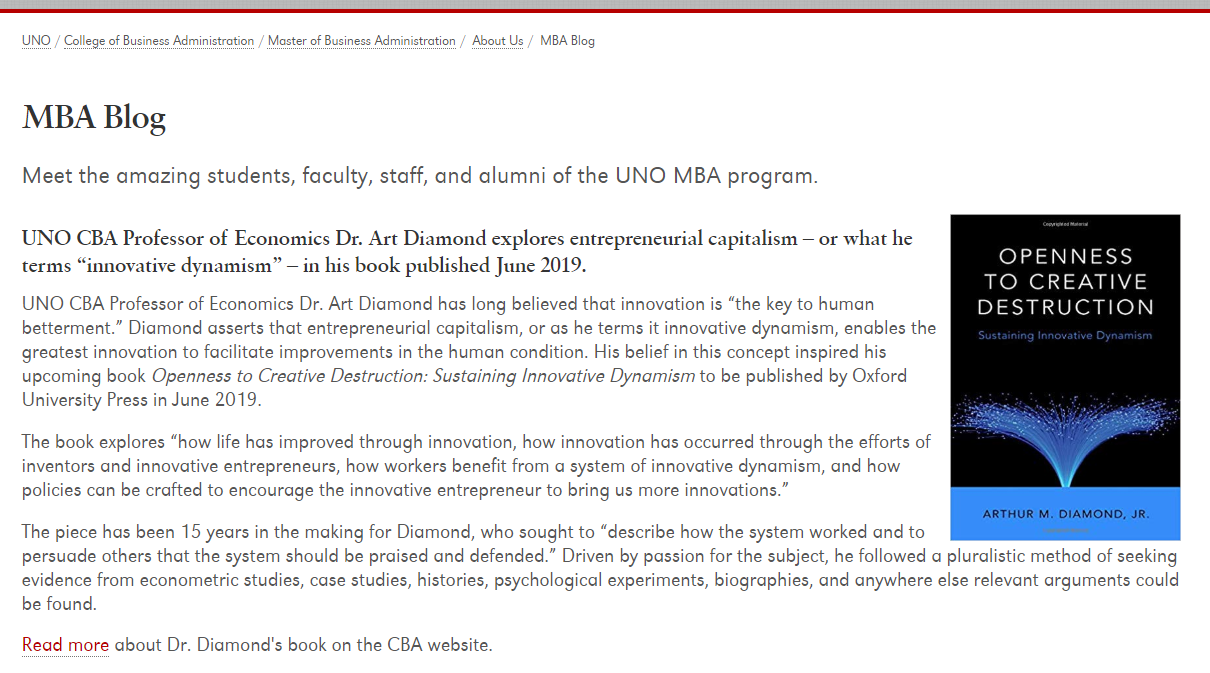The great idealists of our economy are not the socialists, but the heroic entrepreneurs of innovative dynamism. One of the goals of my book Openness to Creative Destruction, and some of my other writings, is to tell their stories to a wider audience. Gonzalo Schwarz has let me know that his Archbridge Institute is also telling some of these stories under the heading American Originals at:
Category: Openness to C. D. Book
“Openness to Creative Destruction” Discussed on Power Trading Radio
John O’Donnell interviewed me at 6 PM 11/8/19, about my book “Openness to Creative Destruction” on his weekly Friday show on Power Trading Radio. (In the screen capture above, Merlin Rothfeld is on the left and John O’Donnell is on the right.)
Chapter 4 on “The Benefits–New Goods” for Free Until Nov. 8, 2019
Until November 8, 2019, Oxford University Press is making available for free Chapter 4 of Openness for Creative Destruction: Sustaining Innovative Dynamism. The chapter is “The Benefits: New Goods.” You can download it as a PDF, and then save it or print it, from:
Art Diamond Interviewed on the Small Business Advocate Radio Show
Yesterday morning, Jim Blasingame, the host of his nationally syndicated “The Small Business Advocate” radio show, interviewed me on issues related to my book Openness to Creative Destruction, and “A Disney Story for Young Socialists,” my Oct. 10 op-ed piece in the Wall Street Journal. You can click on the links below to listen to each segment of the interview.
Hunter Hastings Posts “Professor Arthur Diamond on Sustaining Innovative Dynamism” Podcast to His “Economics for Entrepreneurs (E4E)”
The podcast episode “Professor Arthur Diamond on Sustaining Innovative Dynamism,” is also posted at the Mises Institute site: https://mises.org/library/professor-arthur-diamond-sustaining-innovative-dynamism
Nick Ronalds Graciously Praises Art Diamond’s “Openness” Book and EconTalk Podcast Interview
After my EconTalk conversation with Russ Roberts, that was posted on Aug. 12, 2019, 49 comments were left in the Reader Comments section of the web site. I do not know Nick Ronalds, but I am grateful to him for boosting my morale. Below, I quote his comments in full:
Nick Ronalds
Aug 16 2019 at 7:59pm
I was just going to leave a quick comment that this was an entertaining podcast, but also that Diamond came across as unpretentious and totally non-defensive, which helped make the conversation entertaining. There were also some fascinating nuggets, such as the anecdote about the development of the internet at–but mainly after–DARPA.But the fact that Diamond is responding to so many comments makes him much more interesting, and suggests, at the very least, that he has an abundance of energy and a love of the fray.
The last guest who was so active in the comments section was Eugene Fama, so Diamond is in pretty good company.
. . .
Nick Ronalds
Aug 22 2019 at 8:28pm
I am blown away by Arthur’s genial responsiveness. I already got an Amazon book sample of his book but I’ll now feel like a jerk if I don’t just go and buy it.
The EconTalk podcast can be found at: https://www.econtalk.org/arthur-diamond-on-openness-to-creative-destruction/
UNO MBA Blog Highlights Diamond’s Openness to Creative Destruction

As of 10/11/19, the URL for the entry was: https://www.unomaha.edu/college-of-business-administration/mba/about-us/mba-blog.php
(My seminars on “Economics of Entrepreneurship” and “Economics of Technology” are electives in the MBA program, the economics masters program, and the undergraduate economics program.)
“A Disney Story for Young Socialists” Op-Ed in Wall Street Journal
My op-ed touches on a couple of the themes of my book Openness to Creative Destruction: Sustaining Innovative Dynamism. The URL for the online version of my op-ed piece is: https://www.wsj.com/articles/a-disney-story-for-young-socialists-11570661652
Wright Stuff Op-Ed by Art Diamond Is Published in Davis Enterprise
My op-ed piece “When New Yorkers Cheered the Wright Stuff” has a message that is complementary to my book Openness to Creative Destruction.
Addendum: “When New Yorkers Cheered the Wright Stuff” was syndicated through InsideSources.com. To be best of my knowledge, it was run by three newspapers. Davis Enterprise. [California.] Sun., Sept. 22, 2019, p. B5; Findlay Courier. [Ohio.] Sat., Sept. 28, 2019, p. A4; Monroe News. [Michigan.], Tues., Oct. 1, 2019, p. 4A.
Ryan Bourne Calls Openness to Creative Destruction Book “a New Tour De Force”
YouTube Clip on “Brunelleschi and Ghiberti’s Rivalry” Excerpted from EconTalk Podcast
A brief YouTube clip on “Brunelleschi and Ghiberti’s Rivalry,” excerpted from the EconTalk podcast on Openness to Creative Destruction. The host and interviewer was Russ Roberts of Stanford University’s Hoover Institution. If you click above, the podcast should play right within my blog.

